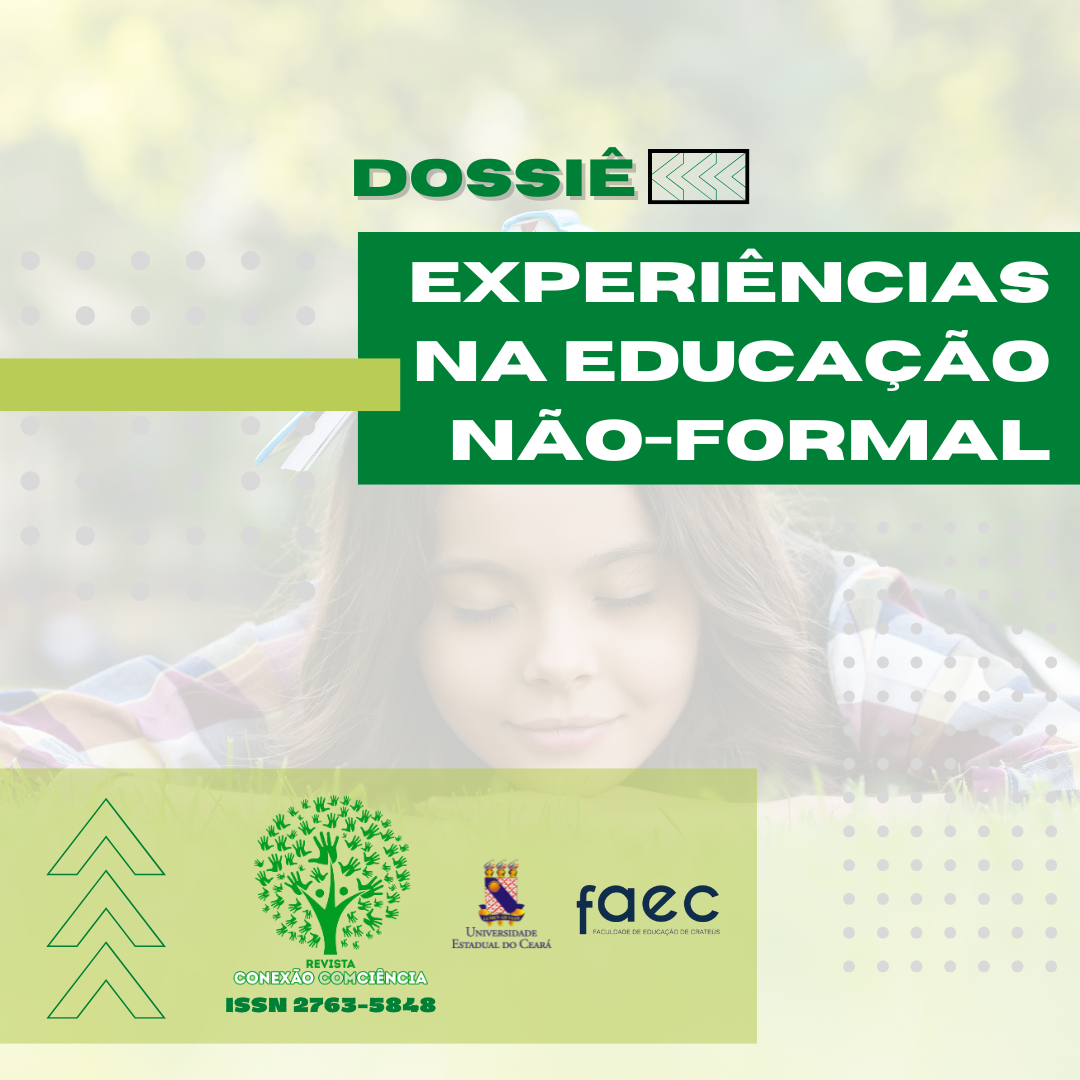Teatro como Educação Não Formal Sensibilidade Pedagógica, inclusão 60+ e pensamento crítico em contextos digitais
Conteúdo do artigo principal
Resumo
Este estudo investiga como o Teatro, enquanto prática de Educação Não Formal, contribui para a transformação humana através da Sensibilidade Pedagógica em processos criativos. A pesquisa, realizada no contexto do curso autoral de teatro com ensino de idiomas online ¿Hablas Español?, incluiu a produção do audiodrama Los Ciegos e contou com participantes 60+ do programa de extensão “universIDADE” da Unicamp. Utilizando o Teatro do Oprimido de Augusto Boal e os Jogos Teatrais de Viola Spolin em videochamadas, o projeto propõe uma abordagem horizontal entre educador e participantes, rompendo com as máscaras sociais, vistas nos “Jogos da Verdade” de Foucault (1990). O teatro é explorado como Metodologia Ativa para enfrentar os impactos do “Capitalismo Cognitivo” (Rolnik, 2006), estimulando criatividade e expressão crítica. Alinhado ao 4º ODS da ONU, os resultados indicam redução de isolamento, desbloqueio criativo e conscientização sobre fake news, promovendo uma formação integral e crítica em um mundo conectado.
Detalhes do artigo

Este trabalho está licenciado sob uma licença Creative Commons Attribution 4.0 International License.
Referências
BOAL, Augusto. Teatro do Oprimido e outras poéticas políticas. Rio de Janeiro, Civilização Brasileira, 1980.
BOAL, Augusto. 200 exercícios e jogos para o ator e o não-ator com vontade de dizer algo através do teatro. 4º edição, Ed: Civilização Brasileira. Coleção TEATRO HOJE, Volume 30. 1982.
DESGRANGES, Flávio. Flávio Desgranges dialoga con Jorge Dubatti sobre su libro Decirse público. Vídeo. "XIV JORNADAS NACIONALES Y IX JORNADAS LATINOAMERICANAS DE INVESTIGACIÓN Y CRÍTICA TEATRAL DE AINCRIT 2023", publicado em 13 de maio de 2023. Acesso em: 24 ago. 2023.
DESGRANGES, Flávio. Decirse público: entre la mediación teatral y el efecto estético. Série: Teatros Latino-Americanos 1. direção de Gina Monge Aguilar & Flávio Desgranges Coleção: Teatro/Artes Cênicas 126 direção de Flávio Desgranges & Rosangela Patriota. São Paulo, 1ª edição, Hucitec Editora. 2022
DORT, Bernard. "Uma propedêutica da realidade", in O Teatro e sua Realidade, trad. Fernando Peixoto. São Paulo: Perspectiva, 1977, p.22 apud SARRAZAC, Jean-Pierre. Léxico do Drama Moderno e Contemporâneo. São Paulo: Perspectiva, 2004.
DUBATTI, Jorge. Experiência teatral, experiência tecnovivial: nem identidade, nem campeonato, nem superação evolucionista, nem destruição, nem vínculos simétricos. Rebento, São Paulo, no. 14, Jan-Jun 2021, p.. Disponível em:
http://www.periodicos.ia.unesp.br/index.php/rebento/article/view/609. Acesso em: junho de 2023
DUBATTI, Jorge. Filosofía del Teatro III. El teatro de los muertos. Buenos Aires: Atuel, 2014a.
FONTOURA MOTTA, Gabriel. LOS CIEGOS - MAURICE MAETERLINCK. Episódio de podcast (audiodrama). Publicado em 27 de outubro de 2023. Duração: 44 minutos.
FONTOURA MOTTA, Gabriel. Entrevista concedida a PACETE, Luiz Gustavo. Podcast "Habitability", EP 60, “Do cinema ao teatro: as cidades estão acessando as artes no Brasil?”, Episódio de Podcast (videocast) entrevista, canal da Construtora MRV&CO, produção de WePod, realizado em 24 de janeiro de 2024, no Estúdio Jacarandá, no bairro da Liberdade, São Paulo - SP. Duração: 44 minutos.
FONTOURA MOTTA, Gabriel. ¿HABLAS ESPAÑOL?: uma análise metodológica da Sensibilidade Pedagógica no ensino do teatro online com o uso da língua espanhola como instrumentalização digital de pessoas 60+. 2024. 1 recurso online (300 p.) Dissertação (mestrado) - Universidade Estadual de Campinas (UNICAMP), Instituto de Artes, Campinas, SP. Disponível em:
https://hdl.handle.net/20.500.12733/22647. Acesso em: 29 nov. 2024
FONTOURA MOTTA, G.; FRANKL SPERBER , S. Noite de Arepas: Uma análise metodológica do processo criativo autoral, um audiodrama, realizado com Jennifer Espitia, imigrante venezuelana, refugiada no Sul do Brasil durante um lockdown. LETRAS EM REVISTA, [S. l.], v. 15, n. 2, 2024.
FOUCAULT, Michel. “A escrita de si”, Corps écrit, nº. 5: L’autoportrait, fevereiro de 1983, ps. 3-23.
FOUCAULT, Michel. Ética, Sexualidade, Política. Tradução Elisa Monteiro e Inês Autran Dourado Barbosa. Rio de Janeiro: Forense Universitária, 2004. (Coleção Ditos & Escritos IV) Título original: Dits et écrits V. (1983)
FOUCAULT, Michel. O que é um autor? Lisboa: Passagens, 1983. (1969-1971)
FOUCAULT, Michel. Tecnologías del yo y otros textos afines. Barcelona: Ediciones Paidós Ibérica, S.A. 1990
FREIRE, Paulo. Educação e mudança.12ª edição. Rio de Janeiro. Editora Paz e Terra, 2011
LIMA, Estefania. Metodologias ativas ajudam a diversificar e a transformar a sala de aula. Correio Braziliense, Brasília, 6 set. 2024. Disponível em: https://www.correiobraziliense.com.br/euestudante/educacao-basica/2024/09/6933532-metodologias-ativas-ajudam-a-diversificar-e-a-transformar-a-sala-de-aula.html. Acesso em: 8 set. 2024.
LOVATO, Fabricio Luís; MICHELOTTI, Angela; LORETO, Elgion Lucio da Silva. Metodologias Ativas de Aprendizagem: Uma Breve Revisão. Acta Scientiae, Canoas, v. 20, n. 2, p. 154-171, mar./abr. 2018. DOI: https://doi.org/10.17648/acta.scientiae.v20iss2id3690. Disponível em: http://www.periodicos.ulbra.br/index.php/acta/article/view/3690
MAETERLINCK, Maurice. LOS CIEGOS. (1890) Versión libre del Teatro Matacandelas, Bogotá, Colômbia. Sobre traducciones de G. Martínez Sierra, Antonio Villasalva y Carlos Vásquez. Año 2001. Disponível para acesso em
https://www.matacandelas.com/Guion-De-LosCiegos-De-MauriceMaeterlinck.html
MAETERLINCK, Maurice. O tesouro dos humildes. São Paulo: Pensamento, 1951. (Trad. Maria José Sette Ribas).
MAETERLINCK, Maurice.; MOLER, L. B. Um teatro de Andróides (1945). Pitágoras 500, Campinas, SP, v. 3, n. 1, p. 88–92, 2013. Disponível em: https://periodicos.sbu.unicamp.br/ojs/index.php/pit500/article/view/8634738 Acesso em: 15 nov. 2023.
RODRIGUES, Larissa. Parlamentares pedem para Itamaraty apurar atuação de embaixadas para impedir espanhol obrigatório. CNN Brasil, 24 jul. 2024
ROLNIK, S. Cartografia sentimental. Porto Alegre: Sulina, 2006.
SANTAELLA, Lúcia. Transcriar, Transluzir. Transluciferar: A Teoria da Tradução de Haroldo de Campos. Céu Acima (Org. Leda Tenório da Motta). São Paulo: Perspectiva, p.221-232 (2005). Disponível em:
http://www.casadasrosas.org.br/crhc/arquivos/revista-circulado-ed5.pdf
SARRAZAC, Jean-Pierre. Léxico do Drama Moderno e Contemporâneo. São Paulo: Perspectiva, 2004.
SÊNECA, Lettres à Lucilius (trad. H. Noblot), Paris, Les Belles Lettres, “Collection des Universités de France”. 1957, t. III, livro XI, carta 84, § 1, p. 121.
SETTI, Isabel. "O corpo da palavra é fixo deixa-se tocar pelo tempo e seus espaços" In: Sala Preta, Revista do Depto. de Artes Cênicas / ECA / USP. São Paulo, n..7, 2007.
SPERBER, Suzi Frankl. Does suspension of disbelief – and of belief - explain the phenomenon of welcoming fake news?” Published in IJAHSSS Journal, Volume 5 Issue 8, Debasthan, Assam, August 2020. Manuscript Id : 1179451192 / ISSN: 2582-1601 Disponível para acesso em http://www.ijahss.com/Paper/05082020/1179451192.pdf
SPERBER, Suzi Frankl. Efabulação e Pulsão de Ficção. 2009. Disponível em https://periodicos.sbu.unicamp.br/ojs/index.php/remate/article/download/8636168/3877/5831
SPOLIN, V. JOGOS TEATRAIS: O FICHÁRIO DE VIOLA SPOLIN. Tradução: Ingrid Koudela. S.P.: Perspectiva, 2001.

